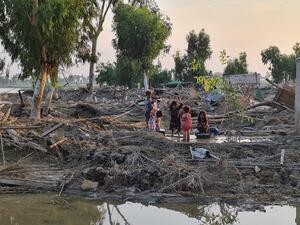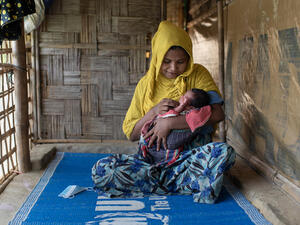UNHCR appeals for US$7 million to repatriate Mauritanian refugees
UNHCR appeals for US$7 million to repatriate Mauritanian refugees

A refugee in Senegal looks across the Senegal River at his home village. UNHCR has launched an appeal for funds to repatriate Mauritanian refugees.
GENEVA, August 31 (UNHCR) - The UN refugee agency on Friday launched an appeal for US$7 million to fund the voluntary repatriation of 24,000 Mauritanian refugees from Senegal and Mali - a return that will help resolve one of the most protracted refugee situations in the world.
Some of the refugees have spent more than two decades in exile, UNHCR spokeswoman Jennifer Pagonis told reporters in Geneva. "The 17-month operation, which faces some major logistical challenges, is scheduled to start in October," she added.
Mauritania announced its decision to invite the refugees to return home on June 20, World Refugee Day, almost two decades after the first of them fled their homeland.
In April 1989, a long-standing border dispute between Mauritania and Senegal escalated into ethnic violence. Some 60,000 Mauritanians fled to Senegal and Mali, with most settling in hundreds of villages along the Senegal River valley. Many Mauritanian citizens were expelled from Senegal to Mauritania.
UNHCR provided assistance to the Mauritanian refugees in northern Senegal until 1995 and facilitated the reintegration of 35,000 returnees who decided on their own accord to return to Mauritania between 1996 and 1998. Most of the refugees remaining in Senegal live in rural areas where they have been granted access to land and public services. Many of them have achieved a certain degree of self-sufficiency.
The new Mauritanian government elected in March has put a priority on the return and reintegration of its nationals in exile with UNHCR's assistance. Some 24,000 Mauritanian refugees living around Senegal wish to return to about 50 communities in four regions of Mauritania, according to the preliminary results of a recent survey conducted by UNHCR and the Senegalese authorities.
In addition, there are a few hundred Mauritanian refugees in Mali, some of whom have also expressed a wish to return home. The talks on the tripartite agreement between the governments of Mauritania and Senegal and UNHCR, which set the legal framework for the return, are in the final stages.
UNHCR will help the Mauritanian refugees return home by organizing safe transport and providing initial reintegration assistance in their places of origin.
There are several logistical challenges to be overcome in this return operation, particularly the lack of adequate roads in Mauritania along the repatriation routes. First, most of the refugees in Senegal who live along the 600-kilometre Senegal River will be transported with their possessions across the river to Mauritania.
Then, off-road vehicles are needed to take the refugees back to their places of origin, which are mostly located far from the main roads. The operation has been carefully planned to avoid the rainy season and its travel difficulties.
The Mauritanian government will ensure that returnees enjoy the same rights and have access to the same services as other Mauritanian nationals. This includes access to documentation and participation in social and economic activities.
"Due to limited absorption capacity and poor infrastructure in return areas, we plan to repatriate up to 7,000 refugees before the end of this year. Other refugees will return during 2008," Pagonis said.
The repatriation programme will also seek to improve the infrastructure and welfare of impoverished communities receiving returnees. "We plan to strengthen the existing education and health services and help to increase income from agriculture and animal husbandry," Pagonis noted.
In order to maximize the use of existing resources and minimize the cost of this new operation, UNHCR will redeploy as many assets as possible from other programmes currently phasing down in West Africa.








